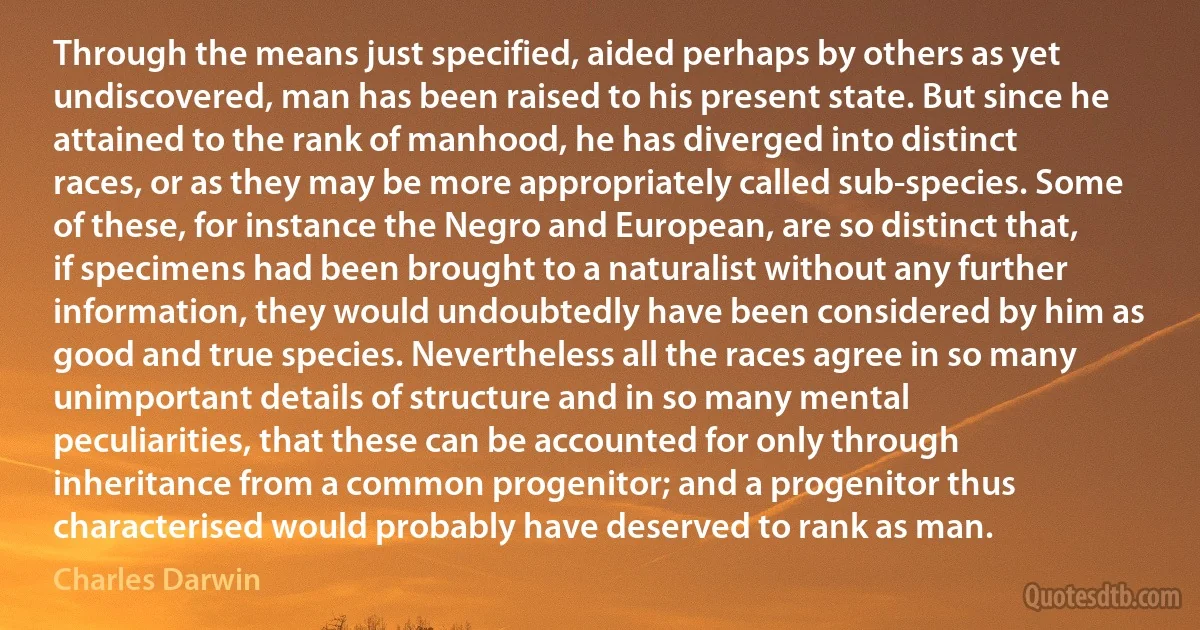
Through the means just specified, aided perhaps by others as yet undiscovered, man has been raised to his present state. But since he attained to the rank of manhood, he has diverged into distinct races, or as they may be more appropriately called sub-species. Some of these, for instance the Negro and European, are so distinct that, if specimens had been brought to a naturalist without any further information, they would undoubtedly have been considered by him as good and true species. Nevertheless all the races agree in so many unimportant details of structure and in so many mental peculiarities, that these can be accounted for only through inheritance from a common progenitor; and a progenitor thus characterised would probably have deserved to rank as man.
Charles DarwinRelated topics
common good inheritance instance man naturalist perhaps present progenitor state thus yet means othersRelated quotes
Amongst the great and numerous dangers to which this country, and particularly the monarchy, is exposed in consequence of the enormous public debt, the influence, the powerful and widely-extended influence, of the monied interest is, perhaps, the most to be dreaded, because it necessarily aims at measures which directly tend to the subversion of the present order of things...I mean an interest hostile alike to the land-holder and to the stockholder, to the colonies, to the real merchant, and to the manufacturer, to the clergy, to the nobility and to the throne; I mean the numerous and powerful body of loan-jobbers, directors, brokers, contractors and farmers-general, which has been engendered by the excessive amount of the public debt, and the almost boundless extension of the issues of paper-money.

William Cobbett
I believe that new art must differ totally in its manifestation from art as we know it, and people may be very reluctant to accept this. It is perhaps true to say, as someone did of cubism, that 'To sum up: since art is a need to create rather than imitate, the 'cubists' rousing themselves from the sentimentality born of the picturesque aspect of some natural spectacle or other, disengage the fleeting aspects from those which are constant and absolute, and with the aid of these two elements, construct a reality equivalent to that which they see before them'. Thus it is a question of finding the true equivalence (that, offered by Cubism is still not true equivalence), and this can only be 'that which is not nature at all, and is nonetheless one with nature.

Piet Mondrian
The worst thing that can happen to advanced devotees who are fixed in Krishna consciousness is that they will go back to the spiritual world. Thus, they are enabled by calamitous situations to go back to Krishna more quickly. It is a part of the process of devotion that from time to time everyone must be tested in various ways. When we take to devotional service we are declaring war against Maya. We are on a battlefield, engaged in our own battle of Kuruksetra. We shouldn't read the Bhagavad-gita and think that it is merely some fascinating ancient history and philosophy. We should also understand that Arjuna is representing every person who is trying to take shelter of Krishna. Arjuna had to undergo bewilderment and serious choices, but Krishna was present to protect him.

Bhakti Tirtha Swami
Perhaps the Patient Protection and Affordable Care Act will attain the enduring status of the Social Security Act or the Taft-Hartley Act; perhaps not. But this Court's two decisions on the Act will surely be remembered through the years. The somersaults of statutory interpretation they have performed ("penalty” means tax, "further [Medicaid] payments to the State” means only incremental Medicaid payments to the State, "established by the State” means not established by the State) will be cited by litigants endlessly, to the confusion of honest jurisprudence. And the cases will publish forever the discouraging truth that the Supreme Court of the United States favors some laws over others, and is prepared to do whatever it takes to uphold and assist its favorites.

Antonin Scalia
[...] we can strip off all grammatical clues to sentence structure, all affixes and prepositions, and yet still achieve communication. Thus restricted to nouns, simple "stories" can be told in word chains: Woman, street, crowd, traffic, noise, haste, thief, bag, loss, scream, police.... Again, the reader's past experience of his language is sufficient to restore the missing elements, sufficiently accurately for the purpose. But of course, not only does the reader have experience of sentence structure, enabling him to supply the missing syntactical elements, but also he has experience of typical contexts in which the various words are used; many words bear an aura about with them. It might be more difficult to tell a tale about a policeman who robbed a woman, for instance, with so little redundancy!

Colin Cherry
